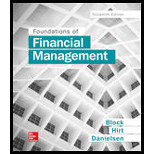
Concept explainers
a.
To calculate: The intrinsic value of the warrant for Gifford Investment Company.
Introduction:
Warrant:
It is a security that provides its holder with an entitlement of buying the underlying shares of a corporation at a price fixed by it.
b.
To calculate: The speculative premium per warrant for Gifford Investment Company when warrants were purchased.
Introduction:
Warrant:
It is a security that provides its holder with an entitlement of buying the underlying shares of a corporation at a price fixed by it.
c.
To calculate: The total dollar
Introduction:
Profit or loss:
It refers to the gain or loss arising from the commercial transactions during a specified period of time and is used to assess the company’s financial performance.
d.
To calculate: The
Introduction:
Rate of return (ROR):
A rate that shows the net profit or loss, an investor earns or loses on the investment over a particular time period is termed as the rate of return.
Want to see the full answer?
Check out a sample textbook solution
Chapter 19 Solutions
Foundations of Financial Management
- finance subjectarrow_forwardCould you help explain, what is the complete salary survey analysis, and ensuring the data is relevant and up-to-date? What is the job evaluation and compensation plan? How to ensure the final report is comprehensive, clearly structured, and aligned with the company vision?arrow_forwardThe maturity value of an $35,000 non-interest-bearing, simple discount 4%, 120-day note is:arrow_forward
- Carl Sonntag wanted to compare what proceeds he would receive with a simple interest note versus a simple discount note. Both had the same terms: $18,905 at 10% for 4 years. Use ordinary interest as needed. Calculate the simple interest note proceeds. Calculate the simple discount note proceeds.arrow_forwardWhat you're solving for Solving for maturity value, discount period, bank discount, and proceeds of a note. What's given in the problem Face value: $55300 Rate of interest: 10% Length of note: 95 days Date of note: August 23rd Date note discounted: September 18th Bank discount rate:9 percentarrow_forwardAll tutor giving incorrect solnarrow_forward
 EBK CONTEMPORARY FINANCIAL MANAGEMENTFinanceISBN:9781337514835Author:MOYERPublisher:CENGAGE LEARNING - CONSIGNMENT
EBK CONTEMPORARY FINANCIAL MANAGEMENTFinanceISBN:9781337514835Author:MOYERPublisher:CENGAGE LEARNING - CONSIGNMENT Intermediate Financial Management (MindTap Course...FinanceISBN:9781337395083Author:Eugene F. Brigham, Phillip R. DavesPublisher:Cengage Learning
Intermediate Financial Management (MindTap Course...FinanceISBN:9781337395083Author:Eugene F. Brigham, Phillip R. DavesPublisher:Cengage Learning


